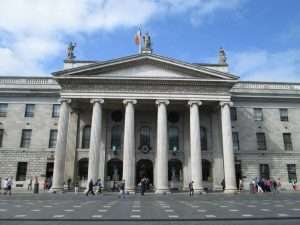Even stories that have been told and retold can sometimes reveal new and unanticipated details. After the saturation coverage of the approaching centenary of the Easter Rising, and every school in the country holding commemoration ceremonies, it seemed that there could be nothing else that might be learned, but RTE radio’s “Drama on One” provided a dimension that never appeared any school textbook.
“100” by Donal Dineen and Jimmy Eadie told of how the rebels who had seized the General Post Office building in what was then known as Sackville Street wished to transmit news of the rebellion. They were particularly anxious that supporters in the United States should hear of events. Opposite the GPO was the Dublin Wireless School of Telegraphy, an establishment that had been closed since the beginning of of the Great War. On the Tuesday of Easter Week, Joseph Plunkett sent seven men across the street to find their way into the sealed telegraphy building and to get the transmission equipment into operation. It had been a dangerous mission, the man charged with raising the transmission mast on the roof of the building had shouted at his comrades to stop throwing stones onto the roof, only to realise that the slates were being hit not by stones, but by bullets.
Radio transmissions in 1916 were generally from a transmitter to a specific receiver, what was transmitted on 25th April 1916 was a broadcast, a Morse signal that announced, “Irish Republic declared in Dublin today. Irish troops have captured city and are in full possession. Enemy cannot move in city. The whole country rising.”
The programme said the receivers of the Short Wave broadcast included two radio stations in Bulgaria, a British ship in the Atlantic, the German army, and an amateur radio enthusiast in Wales, who reported the signal to the authorities. The enthusiast found himself imprisoned for his efforts, his radio equipment was illegal under the wartime security provisions.
It was an intriguing story. How had the men who had sat decoding the morse message reacted to what they wrote? In the chaos brought on Europe by the Great War, conflict in Dublin would probably have been no more significant for the Bulgarians than news of unrest in south-east Europe would have been for the men in Sackville Street, but what of the others? What of those in the North Atlantic, what of the Welshman? Would the message have seemed credible? Would the scenario have been imaginable? A hundred years on, what message today would have a similar impact on those receiving it?
